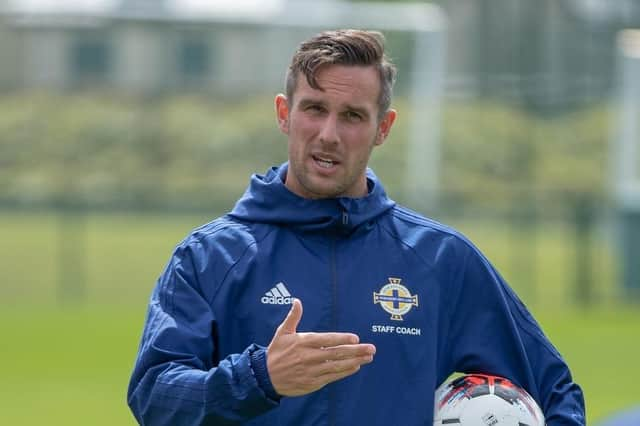Former Irish League star on shock of having a stroke the day after he retired


Andy Waterworth, from Crossgar, Co Down, played the last professional football match of his career for Glenavon in April this year and celebrated his retirement from sport.
But the next morning at 6am, the 36-year-old suffered woke up and his vision was blurred.
Advertisement
Hide AdAdvertisement
Hide Ad"When I woke up I looked at my phone and it was blurry. I looked at the window and a picture in the room and I saw two of each of them. I thought it would go away so I had my breakfast, showered and got my daughter ready. When my vision didn’t get any better I said to my wife, ‘what if it’s a stroke?’, and she said not to be silly as I was only 36 and didn’t have any of the FAST stroke symptoms.”
Andy’s wife drove him to hospital and he underwent lots of tests.
"They couldn’t work out why my vision, and then my balance, was so bad. I then had two CT scans and one of them showed an abnormality. I was told I had suffered a Cryptogenic stroke.”
As a successful footballer who played for Glentoran, Linfield and Glenavon, to name but a few, Andy was fit, stuck to an extremely healthy diet and had regular player health checks. He said the diagnosis came as a “shock”.
Advertisement
Hide AdAdvertisement
Hide Ad“Never in a million years did I think that I would have a stroke. As an athlete, health and fitness is the number one priority and to be fit and well one minute and have a stroke the next was unbelievable.”
Andy was transferred to the Royal Victoria Hospital in Belfast and spent three days there.
“I underwent lots of tests, which thankfully I passed. The physio worked with me in hospital to improve my balance and co-ordination.
“Whilst in hospital, cardiac scans revealed that I had a Patent Forman Ovale (PFO) which is a hole in the heart. This is what caused the stroke. PFOs are very common in young players so it was a relief to know I wasn’t on my own and I had surgery to close the hole.”
Advertisement
Hide AdAdvertisement
Hide AdSpeaking about his recovery Andy said: “Thankfully I have made a brilliant recovery.
"One week later I was back on the golf course, albeit I was a little dizzy bending down to pick up the ball. My way of coping with the fact I had a stroke was to keep busy and try and get back to doing lots of normal things again.”
He added: “Six weeks later I was back in work at the Irish Football Association (IFA) as head of Elite Player Development and they have been so supportive.”
Andy decided to share his story to raise awareness that a stroke can happen to anyone at any age.
Advertisement
Hide AdAdvertisement
Hide AdHe added: “Also, and as I found out, stroke symptoms don’t always present themselves in the way of the FAST acronym, (Face drooping, Arms not being able to lift and Slurred speech). The symptoms of my stroke were visual disturbance and balance difficulties.”
“I would appeal to everyone, if you don’t feel right go and get yourself checked out as a matter of urgency. With strokes it is so important to get seen as soon as possible. I feel lucky that I’ve recovered well and hopefully my story will inspire those who have had strokes to see that having a stroke does not have to be the end of doing the things you love.”
“Having a stroke put things into perspective for me and now I’m happy and really looking forward to spending more time with my family, having holidays and continuing to work in a job that I love.”
Ursula Ferguson, director of Care Services at Northern Ireland Chest Heart & Stroke (NICHS) said: “Problems with balance and co-ordination, difficulty swallowing, sudden blurred vision or loss of sight, or severe headache are also signs of a stroke.
Advertisement
Hide AdAdvertisement
Hide Ad" If you experience any of these symptoms, please call 999 quickly. Time is crucial as the longer the affected part of the brain is without blood, the worse the outcome could be.”
She added; “Having a stroke is a life-changing reality for thousands of people in our local community every year. As well as the negative impact on physical wellbeing, stroke can reduce independence, confidence and happiness.
"Stroke can also affect relationships, take away jobs and careers and render some families isolated within their own homes- but NICHS is here to help with expert care and support.
“The help available from our Care Services team is extensive and, alongside PREP our physical rehabilitation programme, includes family support, health education programmes, our Wellness Sessions, Young Stroke groups, a Return to Work programme and emotional support.
Advertisement
Hide AdAdvertisement
Hide Ad“Our team works across Northern Ireland with people of all ages affected by stroke, alongside their families and carers.
"They are dedicated to supporting people in adjusting to life with a stroke condition, helping them to enjoy life to the full, re-engage with hobbies, and improve their confidence, independence and overall quality of life.”
“In 2021/2022 we helped 1,988 people affected by stroke through our Care Services. Our care pathway supports stroke survivors on their journey from hospital to home and beyond.”
If you have been affected by stroke and need support visit www.nichs.org.uk/our-support-services/stroke for further information about NI Chest Heart & Stroke’s stroke support services.